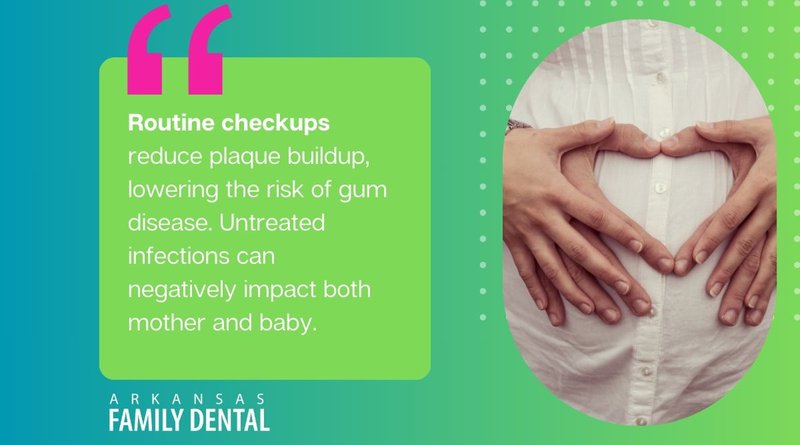Gum Bleeding During Pregnancy: Is it Normal or a Concern?

April 1, 2025
Noticing your gums bleeding during pregnancy can be unsettling. But is it expected, or should you be worried? Hormonal changes and increased blood flow can make your gums more sensitive, often leading to pregnancy gingivitis. While some bleeding is common, ignoring it can cause bigger problems.
Key Takeaways:
- Pregnancy gingivitis affects 60-75% of pregnant individuals, causing swollen, bleeding gums due to hormonal changes.
- Increased estrogen and progesterone make gums more sensitive to plaque, leading to inflammation.
- Higher blood flow to gums increases sensitivity, making them prone to bleeding.
- Bleeding gums can appear as early as the first trimester and may be an early pregnancy symptom.
- Untreated gum disease can lead to periodontal disease, tooth loss, preeclampsia, and low birth weight.
- Preventive care includes brushing twice a day, flossing, using alcohol-free mouthwash, and seeing a dentist.
- Safe treatments include professional cleanings, fluoride toothpaste, and saltwater rinses.
- Regular dental checkups during pregnancy help prevent complications, but elective procedures should be delayed.
- Pregnancy gingivitis usually resolves after birth but may persist if oral health was neglected.

Gum Bleeding During Pregnancy: Causes
Pregnancy affects nearly every part of your body, including oral health. If you’ve noticed your gums bleeding when brushing or flossing, you’re not alone. This common condition, known as pregnancy gingivitis, impacts 60-75% of pregnant individuals. Hormonal shifts make gums more sensitive, increasing the likelihood of inflammation and bleeding.
Hormonal Changes Affect Gum Health
Hormones significantly impact oral health during pregnancy and can cause gum bleeding during pregnancy. Higher levels of estrogen and progesterone make gums more reactive to plaque, a buildup of bacteria that can cause redness, swelling, and bleeding, even with gentle brushing. The immune system also responds differently, making it harder to fight gum infections. Maintaining good oral hygiene becomes even more important during pregnancy.
Increased Blood Flow
Pregnancy increases blood flow to mucous membranes, including the gums. This extra circulation makes the gums softer, more sensitive, and prone to bleeding during routine brushing. While uncomfortable, this issue often resolves after birth with proper care.
Gum Bleeding and Pregnancy
Some women notice gum sensitivity as early as the first trimester. Hormonal fluctuations can cause gum swelling and bleeding before other pregnancy symptoms appear. While this isn’t a reliable way to confirm pregnancy, it is one of the early physical changes some women experience.
Caring for your gums during pregnancy supports both your health and your baby’s well-being. To learn more, check out this guide on the connection between pregnancy and dental health. If symptoms worsen, pregnancy gingivitis may develop and should be addressed. Visit the Cleveland Clinic’s guide on pregnancy gingivitis for more information.
The Risks of Gum Bleeding in Pregnancy
Pregnancy gingivitis is common, but it can lead to serious problems if left untreated. It affects up to 75% of pregnant individuals, causing swollen, red, and bleeding gums due to increased hormone sensitivity to plaque buildup.
The Signs of Pregnancy Gingivitis
The most obvious symptom is gum bleeding during pregnancy, especially when brushing or flossing. Other signs include red, swollen, and tender gums, bad breath, and gum sensitivity. Some may develop shiny gums or mild pain when eating.
How Gum Bleeding During Pregnancy Affects Baby
Severe gum disease can pose risks to the baby. Studies suggest a link between pregnancy gingivitis and premature birth or low birth weight. Oral bacteria can enter the bloodstream, triggering inflammation that may impact pregnancy.
Leaving Gum Disease Untreated
If ignored, pregnancy gingivitis can progress into periodontal disease, affecting the bone that supports the teeth. This can cause tooth loss or chronic oral infections. Some research indicates that periodontal disease during pregnancy may increase the likelihood of preeclampsia and gestational diabetes.
Maintaining good oral hygiene and visiting a dentist regularly can help prevent complications. Brushing, flossing, and professional cleanings are essential for gum health. If symptoms worsen, seek professional treatment. The CDC offers additional guidance on pregnancy and oral health.
Prevent and Treat Gum Bleeding During Pregnancy
Brushing twice a day with fluoride toothpaste is the simplest way to protect your gums. Pregnancy-related hormonal changes make gums more sensitive to plaque, leading to inflammation and bleeding. Use a soft-bristled toothbrush to prevent irritation. Brush for at least two minutes, focusing on the gumline where bacteria build up.
Flossing once daily removes plaque between teeth, reducing gum irritation. Some pregnant individuals avoid flossing due to bleeding, but stopping makes the problem worse. A gentle sawing motion works best.
Rinsing with alcohol-free mouthwash helps reduce bacteria and soothe inflamed gums. Some mouthwashes also contain fluoride to strengthen teeth. Pregnant individuals sensitive to strong flavors might opt for mild varieties.
Regular dental checkups make a difference. Dentists remove plaque buildup and check for gum disease. Many pregnant women qualify for free dental care, making it easier to keep up with oral health.
Natural Remedies for Gum Bleeding During Pregnancy
A saltwater rinse can reduce swelling. Dissolve a teaspoon of salt in warm water and swish for 30 seconds. Repeat twice daily.
Aloe vera gel contains natural anti-inflammatory properties. Applying a small amount to the gums may reduce swelling and discomfort. Choose pure aloe vera without additives.
Drinking green tea may help reduce gum inflammation. The antioxidants in green tea can fight bacteria and plaque buildup. Opt for decaffeinated versions if caffeine is a concern.
Crunchy vegetables like carrots and celery naturally clean teeth and stimulate saliva production, helping rinse away bacteria. Chewing sugar-free gum can have a similar effect.
Reducing Gum Inflammation While Pregnant
Limiting sugary snacks and drinks prevents bacterial growth that leads to gum disease. Instead, eat foods rich in calcium and vitamin C, such as dairy products, leafy greens, and citrus fruits. These contribute to gum health.
Staying hydrated encourages saliva production, helping wash away bacteria. Drinking water consistently throughout the day helps maintain a healthy mouth.
Managing morning sickness properly prevents stomach acid from damaging teeth and gums. If vomiting occurs, rinse with water or a mild baking soda solution before brushing to neutralize acid.
If gum inflammation worsens, schedule a dental checkup. Safe treatments such as cleanings and prescription mouthwashes can ease symptoms. The American Dental Association confirms that dental care is safe during pregnancy and can help prevent complications.
Seeing a Dentist During Pregnancy
Safety Concerns
Regular dental visits are safe. In fact, seeing a dentist at least once during pregnancy, ideally in the second trimester, is recommended. Professional cleanings and exams prevent pregnancy gingivitis from worsening. Specifically, if you’re experiencing gum bleeding during pregnancy.
Routine checkups reduce plaque buildup, lowering the risk of gum disease. Untreated infections can negatively impact both mother and baby. Some research indicates a connection between advanced gum disease and pregnancy complications.
Discuss any oral discomfort with your dentist, who can adjust treatments accordingly.
Postponing Dental Treatments
Non-essential treatments like cosmetic procedures or whitening should wait. Minor fillings or crowns can often be delayed unless pain occurs.
Emergency Dental Care
Severe tooth pain, swelling, bleeding that won’t stop, or infection symptoms like pus or fever require immediate dental care.
Gum bleeding during pregnancy often results from hormonal shifts and increased blood flow. Addressing symptoms early with daily care and professional support promotes lasting oral health. Keep up with brushing, flossing, and checkups to protect both your smile and your baby’s health.
Protect Your Smile: Managing Gum Bleeding During Pregnancy
Experiencing gum bleeding during pregnancy? Hormonal changes can make your gums more sensitive, leading to inflammation and discomfort. Prioritizing your oral health during this time is essential for both you and your baby. Regular dental checkups and a gentle oral care routine can help keep your gums healthy. At Arkansas Family Dental, we’re here to support your dental needs with compassionate care. Schedule an appointment today to keep your smile healthy throughout pregnancy and beyond!
Connect With
Call (501) 232-6273 or request an appointment online to set up your first visit. We’ll be in touch soon.
